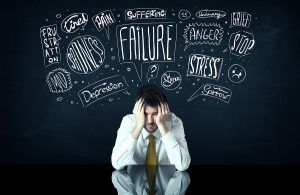How to Stop Anxiety
 Those of us who struggle with anxiety know how it can undermine us. We feel it impair our abilities, lower our spirits and limit the very quality of our lives. Yet, most of us have a hard time challenging our anxiety. Because of its evolutionary purpose and instant, almost instinctive intrusion, we tend to trust or indulge our anxiety instead of defying it.
Those of us who struggle with anxiety know how it can undermine us. We feel it impair our abilities, lower our spirits and limit the very quality of our lives. Yet, most of us have a hard time challenging our anxiety. Because of its evolutionary purpose and instant, almost instinctive intrusion, we tend to trust or indulge our anxiety instead of defying it.
Even though anxiety evolved as a natural reaction to danger, there’s a point for all of us when our anxiety starts to take over and stops being adaptive. We may start perceiving dangers and threats in our daily lives or stop handling problems with calmness, strength and resilience. However, we don’t have to blindly believe our anxious thoughts and the internal alarms that they trigger. There are many strategies to manage feelings of anxiety as well as techniques to understand and challenge its roots. Using these tools, we can intervene and weaken our anxiety.
We can start by understanding that we come by our anxiety honestly. Our hypothalamic pituitary adrenal or HPA axis is the central stress response system in our brain, which releases cortisol and controls our levels of stress and fear. The way in which this system operates is set, in part, by our early life experiences. If we were exposed to highly stressful or anxious conditions, individuals or circumstances, including in our prenatal environment, we may be prone to feel more anxiety as adults. Knowing this, we can have more compassion for ourselves and learn to separate our anxious feelings from reality. Moreover, we can start to think about ways we can break these patterns and shift to living in a less anxious state.
No matter what its source, anxiety is something we can adapt to and overcome within ourselves. We will all experience life events that will cause us to feel anxious, but how we learn to cope with these circumstances is what matters. As mindfulness expert Dr. Jon Kabat-Zinn has said, “There are no drugs that will make you immune to stress or to pain, or that will by themselves magically solve your life’s problems or promote healing. It will take conscious effort on your part to move in a direction of healing, inner peace, and well-being. This means learning to work with the very stress and pain that are causing you to suffer.”
So how can we learn to work with our stress and stop our anxiety? Here are some key steps we can take:
 1. Try mindfulness meditation – Ample research has shown that meditation helps manage anxiety, depression and pain. Mindfulness allows us to become more aware of our thoughts and how our body responds to these thoughts without getting caught up in distress. By focusing on our breath, we are better able to feel less controlled by our anxiety. We can start to see each of our thoughts like a cloud passing instead of as storm that we’re trapped inside.
1. Try mindfulness meditation – Ample research has shown that meditation helps manage anxiety, depression and pain. Mindfulness allows us to become more aware of our thoughts and how our body responds to these thoughts without getting caught up in distress. By focusing on our breath, we are better able to feel less controlled by our anxiety. We can start to see each of our thoughts like a cloud passing instead of as storm that we’re trapped inside.
“By strengthening the mind, you can lower anxiety,” said interpersonal neurobiology expert Dr. Daniel Siegel. “These mindfulness practices have been shown to improve your immune system. They’ve been shown to shift the way the brain functions in a healthy way toward resilience and taking on challenges rather than withdrawing from them.” Dr. Siegel suggests doing a basic breath awareness practice such as his “Wheel of Awareness” exercise, which you can follow in its 8-minute, 22-minute or 32-minute version here.
Anytime you’re feeling anxious, psychologist Dr. Lisa Firestone highly recommends trying the 4-7-8 breathing pattern in which you inhale for a count of four, hold your breath for seven seconds and release the breath for a count of eight. Repeat this cycle five times. This practice has been proven to release serotonin in the brain that naturally calms you down. It also interrupts shallow breathing, a common symptom of anxiety that exacerbates symptoms. Dr. Firestone also recommends putting one hand on your chest and the other on your stomach, whichever way feels right, as you breath. This helps your heart return to synchronization.
Very often, anxiety feels physical. Our brain reads this physiological arousal as fear, but we can calm ourselves by reminding ourselves that we’re okay. By accepting our anxiety from a calm, centered place in which we gently draw our attention back to our breath, we help free ourselves from the mental and physical reactions we have to stress. Mindfulness-Based Stress Reduction, developed by Dr. Jon Kabat-Zinn, brings together mindfulness meditation and yoga has further proven to strongly reduce symptoms of anxiety and relieve individuals from pain.
2. Practice self-compassion – According to findings by leading self-compassion researcher, Kristin Neff, “self-compassion is associated with significantly less anxiety and depression, as well as more happiness, optimism, and positive emotions.” Self-compassion comprises three major elements said Dr. Neff, self-kindness as opposed to self-judgment, mindfulness instead of over-identification with thoughts and common humanity rather than isolation. Adopting these principles allows us to take a more compassionate approach to our anxiety. We can be kind toward our thoughts without allowing them to overpower us, while acknowledging that our suffering is part of the human condition. We should never feel alone or different from everyone else.
 3. Conquer your critical inner voice – It isn’t always what’s happening in our lives that causes us to feel anxious, but what we’re telling ourselves about what’s happening. We all have what psychologists Robert and Lisa Firestone refer to as a “critical inner voice,” a destructive internal thought process that criticizes and undermines us and, consequently, exacerbates our anxiety. In their book Conquer Your Critical Inner Voice, Drs. Robert and Lisa Firestone describe how this voice can contribute to anxiety. It may, for example, pepper our heads with commentary on everything from our jobs to our relationships. “You’re so stupid. You’ll never be able to complete this task.” “You can’t handle this pressure. You’re a failure.” “No one will ever love you, so why even try?”
3. Conquer your critical inner voice – It isn’t always what’s happening in our lives that causes us to feel anxious, but what we’re telling ourselves about what’s happening. We all have what psychologists Robert and Lisa Firestone refer to as a “critical inner voice,” a destructive internal thought process that criticizes and undermines us and, consequently, exacerbates our anxiety. In their book Conquer Your Critical Inner Voice, Drs. Robert and Lisa Firestone describe how this voice can contribute to anxiety. It may, for example, pepper our heads with commentary on everything from our jobs to our relationships. “You’re so stupid. You’ll never be able to complete this task.” “You can’t handle this pressure. You’re a failure.” “No one will ever love you, so why even try?”
As Dr. Lisa Firestone wrote in her blog “Silence the Inner Voice That’s Stressing You Out,” “Even when times are tough or the pressure being placed on us is external, we can seek out an inner sense of calm by quieting those inner voices that exacerbate the problem.” There are many steps we can take to identify and challenge this inner enemy and help free ourselves from its intrusion.
4. Don’t feed the monster – When we feel anxious, it’s easy to seek relief by listening to our critical inner voice, which tells us what to do to relieve our anxiety. The trouble is this coach often offers terrible advice. It keeps us from facing our fears and going after what we want. It’s important to not give in to feelings of anxiety and to keep taking the actions that move us toward our goals. If we indulge in our anxiety by avoiding or retreating from something like a job interview or asking someone on a date, we may feel temporary relief, but ultimately, we give our anxiety a lot more power and become more anxious over time. Giving in or stopping the actions that stir us up is like feeding the monster that is anxiety. Starving the monster by refusing to back down may make us more anxious in the immediate sense, but ultimately it will shrink our fears and strengthen our resilience.
5. Build your hardiness –Increasing our emotional resilience and emotional intelligence is invaluable to our overall well-being, and it naturally helps us handle anxiety. In 35 years of research, founder of The Hardiness Institute, Dr. Salvatore Maddi, has discovered specific characteristics people can cultivate in order to become more emotionally resilient or “hardy.” By learning these traits, we become better equipped to handle unexpected challenges and stresses life will inevitably throw at us. Dr. Maddi describes three fundamental elements to hardiness, which he calls the three C’s:
- Challenge – seeing problems as challenges as opposed to overwhelming threats.
- Control – handling tough situations by feeling empowered and taking action.
- Commitment – staying motivated and committed even through hard times, pushing through obstacles with intention.
Hardy individuals tend to see change as a positive challenge. They’re open to new ideas and feel confident and capable in solving problems, rather than avoiding stress.
 6. Exercise more – Recent studies have confirmed that exercise can reduce anxiety symptoms. One Mayo Clinic article lists the physical benefits of exercise in terms of anxiety reduction as releasing feel-good brain chemicals like endorphins, reducing immune system chemicals that can make us feel downand increasing body temperature, which may help us feel calmer. Psychologically, exercise can help us feel more confident, distract us from worries, increase our social interactions and allow us to cope with stress in a healthy way.
6. Exercise more – Recent studies have confirmed that exercise can reduce anxiety symptoms. One Mayo Clinic article lists the physical benefits of exercise in terms of anxiety reduction as releasing feel-good brain chemicals like endorphins, reducing immune system chemicals that can make us feel downand increasing body temperature, which may help us feel calmer. Psychologically, exercise can help us feel more confident, distract us from worries, increase our social interactions and allow us to cope with stress in a healthy way.
7. Get out in nature – A report from the University of Minnesota states, perhaps unsurprisingly, that “Being in nature, or even viewing scenes of nature, reduces anger, fear, and stress and increases pleasant feelings.” Even having a plant nearby can help us feel less stress and anxiety.Nature has phenomenal healing effects on mood and can be a powerful tool in coping with anxiety. Getting outside, taking a walk and breathing fresh air can help us reach a state of calm. It allows us to appreciate a sense of awe and gain an often much-needed perspective on what troubles us.
8. See a Therapist – Therapy can be very helpful in our fight against anxiety. Cognitive Behavioral Therapy (CBT) has been consistently proven to be highly beneficial to individuals who suffer. Seeking therapy is an act of strength and can be an instrumental step to feeling better. Voice Therapy, developed by Dr. Robert Firestone is one form of CBT that can help people recognize and challenge their critical inner voice and alleviate the symptoms of anxiety that it generates.
Remember that it is always destructive to torture yourself with extreme anxiety-provoking thoughts. There are many anxiety disorders that can have a severely negative impact on your life. If you are in pain or in crisis and feel you need help, there are many treatments available and places you can seek help. The following is a list of resources on anxiety:
National Institute of Mental Health -Anxiety
WebMD – Anxiety
Anxiety Disorders Association of America
Insight Journal
GET HELP:
IF YOU OR SOMEONE YOU KNOW IS IN CRISIS OR IN NEED OF IMMEDIATE HELP, CALL 1-800-273-TALK (8255).
This is a free hotline available 24 hours a day to anyone in emotional distress or suicidal crisis.
International readers can click here for a list of helplines and crisis centers around the world.
Tags: anxiety, anxiety symptoms, critical inner voice, mindfulness, personal growth, psychological advice, self development, stress, stress management










I always read these articles that say evolution was responsible for this or that human feature. Do you have anything to back that up? Is it just a conjecture, or has someone been able to prove exactly how this evolved? After all, it’s scientific, so I imagine there is empirical literature behind it. Thanks.